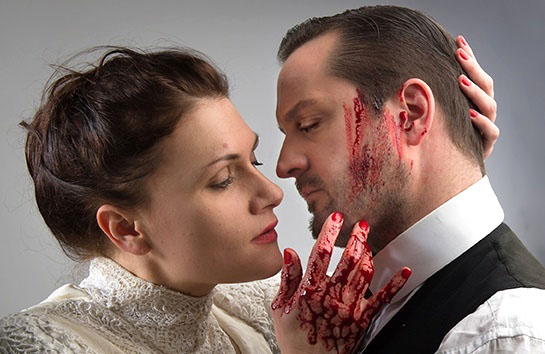
I am a big fan of English Touring Opera. I think they have a policy from which all other theatre companies could learn a great deal. ETO flies in the face of conventional regional theatre wisdom that for a show to succeed it must have a star name (preferably from some TV soap) and/or be work by a popular writer – Agatha Christie, Alan Ayckbourn et al. Not only does ETO tour opera, which is in itself a minority taste, but it also presents works which are, even to opera buffs, a bit obscure. On a hiding to nothing, you would have thought.
Yet English Touring Opera demonstrates that if you whet your audience’s appetite with exotic little morsels which they have not tasted before and, more importantly, present them immaculately in a highly original and innovative way, you will succeed. ETO presents not just good opera, it presents good theatre and at a reasonable price.
Their current tour consists of Gluck’s Iphigénie en Tauride, Donizetti’s Pia de’ Tolomei and the banker, Mozart’s Don Giovanni.
Don Giovanni is one of the opera canon’s most dramatic works. You have hardly got your hat and coat off and taken your seat before there is a rape and a bloody murder. Don G is one of opera’s most dastardly villains whose sole raison d’être is to lay as many women as possible in the shortest possible time and to hell with the consequences. As a character he has no redeeming features (unless you count smarmy charm as one) and last night he was sung by the excellent George von Bergen who cut a very impressive figure with his black frock coat, shiny shoes and equally shiny Brylcreemed hair. You could see what the ladies saw in him as his slim, tall figure strutted around the stage and swung from various bits of the set. Mr von Bergen has a beautiful, luscious voice which added to his irresistibility. His trusty, though moaning sidekick, Leporello is always on hand to keep score in his little book and provide the laughs and, played by Matthew Stiff, he is the perfect foil for his rotter of a master. He also sang beautifully but for me it was the fine acting of the pair which was equally impressive.
The wronged ladies were all good of which Ania Jeruc as Donna Elvira shone brightest and I also liked Bradley Travis as Masetto. All the singing was excellent but again, it was the acting that impressed.
Special mention must be made of the set and lighting. Visually this production is outstanding. The towering stone arc of a set with its fire-escape type stairs designed by Anna Fleischle seamlessly became the various locations and would not have been out of place in any of the leading opera houses of the world. It became even better under the really stupendous, ever-changing lighting by Guy Hoare which enhanced, and often created, the drama. The scene where the ghost of Il Commendatore appears was truly magnificent.
In the pit the small but perfectly formed orchestra under the baton of John Andrews did not put a foot wrong, with Mr Andrews himself playing a dinky little clavier, which he had on his rostrum, for the recitative.
All in all a hugely satisfying evening. English Touring Opera is a joy to behold and I genuinely look forward to every visit – and there are not many companies I can say that about. ★★★★★ Michael Hasted 13th April 2016
Iphigénie en Tauride – A group of women in blood-stained butchers’ aprons drag a man onto the stage and proceed to hack him to death. So opens the ETO’s stunning production of Gluck’s rarely produced opera. As in all Greek tragedies there is much blood and human sacrifice and the cast of ETO do it justice with heart-rending and at times blood-curdling singing.
Iphigénie has been saved by Artemis after her father, Agamemnon, tries to sacrifice her to help him win the war. Believing Iphigénie dead her mother Clytemnestra kills her husband Agamemnon only to be killed by her son Orestes, brother of Iphigénie. So far so Greek, but Iphigénie pays dearly for her survival – Artemis has installed her as priestess on Tauride (modern Crimea) with a duty to slay all Greeks passing by. When her brother Orestes arrives as a prisoner on Tauride she does not recognise him. The local despot demands his death and she is set to kill him in a scene reminiscent of Christ going to the cross.
Catherine Carby’s mezzo soprano voice, as always, goes straight to the heart and her role as Iphigénie is a tour de force. The scene in which Orestes (Grant Doyle) and Pylade (John-Colyn Gyeantey) wrestle with each other to decide which one should die at the hands of Iphigénie was for me the most moving. The contrast of Doyle’s forceful tenor voice and Gyeantey’s lyrical singing sends a shiver up the spine.
Here, as in the production of Don Giovanni, Anna Fleischle’s set was of one of masterful restraint, with Guy Hoare’s lighting dramatically doing much of the heavy lifting. A scene with hands emerging from small dark spaces to reach for the tormented Orestes brought to mind the overcrowded hellish prisons of a third world country. James Conway’s direction and Bernadette Iglich’s choreography were faultless, creating tableaux resembling the images on Greek vases. Martin André beautifully conducted Gluck’s rousing music with great élan. ★★★★★ Astrid Burchardt 6th April 2016

